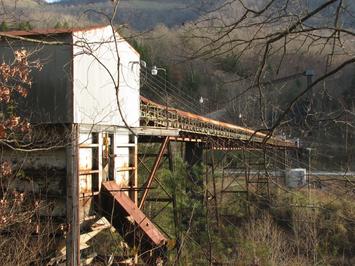
When I think of the energy crisis, I cannot help but think of the poignant story of Martin Toler. A victim of the Sago Mine disaster, he was found sitting alongside his 12 fellow miners in darkness. Deep in the heart of the earth he wrote a note to his family as air and time was running out: “Tell all that I’ll see them on the other side,” read the note found lying beside his body. “It wasn’t bad. I just went to sleep. I love you.”
Toler’s incredible courage to care for family first in the face of certain death reflects some of the Appalachian culture. Yet the region has struggled from the beginning of its settlement. It has almost always been poor. The world of small towns in Appalachia stands light years from the “flat” world of Friedman or the green certainties of elite urbanites.
Not surprisingly, we find it hard to simply dismiss coal and other fossil fuels with such aplomb. Inez, Kentucky, the birthplace of LBJ’s War on Poverty in 1964, has struggled over the years with the boom and bust of the coal business. And, despite the news media insistence that it isn’t doing well, its unemployment rate is well below that of other more “successful” communities.
We look at the revival of coal as a potential source of economic sustenance for our communities. This does not mean we have to abandon the environment or the strict safety standards that might have saved Martin Toler. But neither do people there want to abandon their towns and the ability to make a good living for their families.
Marvin Toler and his fellow miners lived through the boom and bust of the energy cycles. They lived through bitter debates over mine safety, unscrupulous and/or absentee owners, black lung, mine disasters brought on by lax standards, slurry spills and mountaintop removal. Yet mining has also provided a good living for people and a way to keep the towns we love alive.
Our hope is that energy could revive our communities. Perhaps we can rewrite the story of coal through standards that make mining safer and technology that can make it cleaner. Our greatest hope is that, with American ingenuity and Appalachian persistence, we can think up new and alternative sources of energy right in the heart of the Appalachian Mountains.
Marvin Toler didn’t have to go far to convince me of the strong stock and strength of him and his forebears. As the American dream undergoes renovation, I need go no further than Toler’s last words, scribbled in darkness but full of hope, strength, resilience and love – all qualities that remain true even in our bewildering world. His words transcend the YouTube culture and go to the heart of the matter. Perhaps that mountain fortitude of his is the perfect quality for starting a new energy revolution.
Appalachia will always be about the rugged sorts who settled there. Those who worked the mines and tilled the soil did not ask for much. They worked hard and didn’t count the cost or avoid taking risks. Coal could be part of that future, but the spirit of this place could also extend to other tasks that need smart, tough and risk-taking folks. We don’t need to become more dependent on the coal mines, but we think they can be part of creating a new wave of opportunity for our communities – if we can find the will.
Sylvia L. Lovely is the Executive Director/CEO of the Kentucky League of Cities and president of the NewCities Institute. She currently serves as chair of the Morehead State University Board of Regents.













Most of the time I don’t
Most of the time I don’t make comments on websites, but I'd like to say that this article really forced me to do so. Really nice post!
website